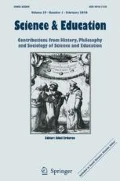In late February 2019, when the Covid-19 crisis began to spread across South Korea, my doctoral student Wonyong Park was there for his data collection in secondary schools. Unphased by the growing national epidemic at the time, he remarked: “As a Cambridge student, Newton once had to return home due to the plague outbreak in England, during which he made his greatest discoveries! However, as the situation develops, I promise I’ll keep healthy and make this time most useful for me.” Now, about a month later, the entire planet finds itself in the midst of a pandemic.
Among the countries worst hit by the pandemic is Italy where one of our Associate Editors, Olivia Levrini, is based. During a recent exchange, she raised the question of how history, philosophy and sociology of science (HPS) might contribute to science education in the era of a pandemic. Given the novelty of the issues generated by a major health emergency, Science & Education invites colleagues to submit papers broadly addressing the following theme: “Science Education in the Era of a Pandemic: How can History, Philosophy and Sociology of Science Contribute to Education for Understanding and Solving the Covid-19 Crisis?”
Past pandemics can point to not only the development of scientific explanations in time but also the societal contexts that harboured them. Consider the stigma associated with syphilis characterised as a French or an Italian disease depending on where the disease was observed in the fifteenth century; the framing of cholera in the colonial discourse in Asia and the impact of the disease on global trade in the nineteenth century; or the mistaken causality drawn between a country and an outbreak in the case of the Spanish flu in the early twentieth century. History is replete with countless lessons about pandemics in terms of their societal, ethical as well as their scientific and medical dimensions.
The current pandemic is set against a backdrop of growing mistrust in science sometimes deliberately promoted for political ends, for instance, as is the case of climate change denial. There is an unprecedented need to educate the future scientists as well as the general public in engaging not only in evidence-based reasoning and critical thinking but also in action-oriented and socially responsible citizenship. Education systems from around the world urgently need to embrace curriculum, instruction and assessment approaches that will empower students by adopting scientific habits of mind. The current health emergency is putting heavy demands on the quality of online learning environments. High stakes assessment systems face significant accountability challenges in obtaining reliable measures of learning outcomes when students cannot attend examinations in person. The informal or non-formal learning environments including families, museums and other institutions of social networking are having to adopt to different ways of interacting, and they are pivotal in ensuring that a systemic approach to scientific literacy can be established across society.
The Covid-19 pandemic can potentially last for an extended period and its impact on contemporary science and society is likely to be felt for a long time. Thus, the papers focusing on the theme will not be restricted to a special issue. Rather, Science & Education wishes to encourage colleagues to engage in this topic now and over a length of time with the possibility of manuscripts appearing in the upcoming issues and volumes. The papers may include, but are not limited to:
Position papers about how HPS can contribute to science education in the era of the Covid-19 pandemic, for instance how science education can equip citizens with scientific skills to understand and to cope with the pandemic;
Historical case studies of pandemics and lessons learned for inclusion in science education;
Analysis of narratives and discourse about pandemics in contemporary mainstream news and social media with implications for public understanding of science;
Philosophical reflections on what counts as science and science education in the midst of a pandemic;
Accounts of science education as a research community at the time of a pandemic including the current demands and limitations of conducting and communicating research as well as academic community building;
The implications of social distancing and self-isolation measures for how scientific cultures and science learning communities (e.g. in schools, higher education institutions, research centres) organise themselves in adapting to a pandemic;
Critical reflection on science and more broadly on STEM curricula in terms of preparing the future generations for acquiring knowledge and skills to deal with global concerns such as pandemics and the climate emergency;
Investigations into various approaches to integrating HPS into teaching and learning of science through online resources and long-distance learning communities among teachers, students, parents, care-givers and other educational stakeholders.
In addressing such themes in their work, the community of educators, philosophers, historians, sociologists and other professionals are increasingly retreating into self-isolation and social distancing. Members of our community are facing new ways of working and some have no work or reduced work due to illness and/or care responsibilities. Science & Education considers it important to engage our community in constructive debates about how science education can contribute to understanding and solving the Covid-19 crisis. Inspired by Newton’s accomplishments including the work on his theory of gravity during the plague, we aim to make these uncertain and distressful times purposeful and productive for the research and learning communities engaged in the improvement of science education through history, philosophy and sociology of science.
Author information
Authors and Affiliations
Corresponding author
Ethics declarations
Conflict of interest
The author declares that she has no conflict of interest.
Additional information
Publisher’s Note
Springer Nature remains neutral with regard to jurisdictional claims in published maps and institutional affiliations.
Rights and permissions
About this article
Cite this article
Erduran, S. Science Education in the Era of a Pandemic. Sci & Educ 29, 233–235 (2020). https://doi.org/10.1007/s11191-020-00122-w
Published:
Issue Date:
DOI: https://doi.org/10.1007/s11191-020-00122-w

